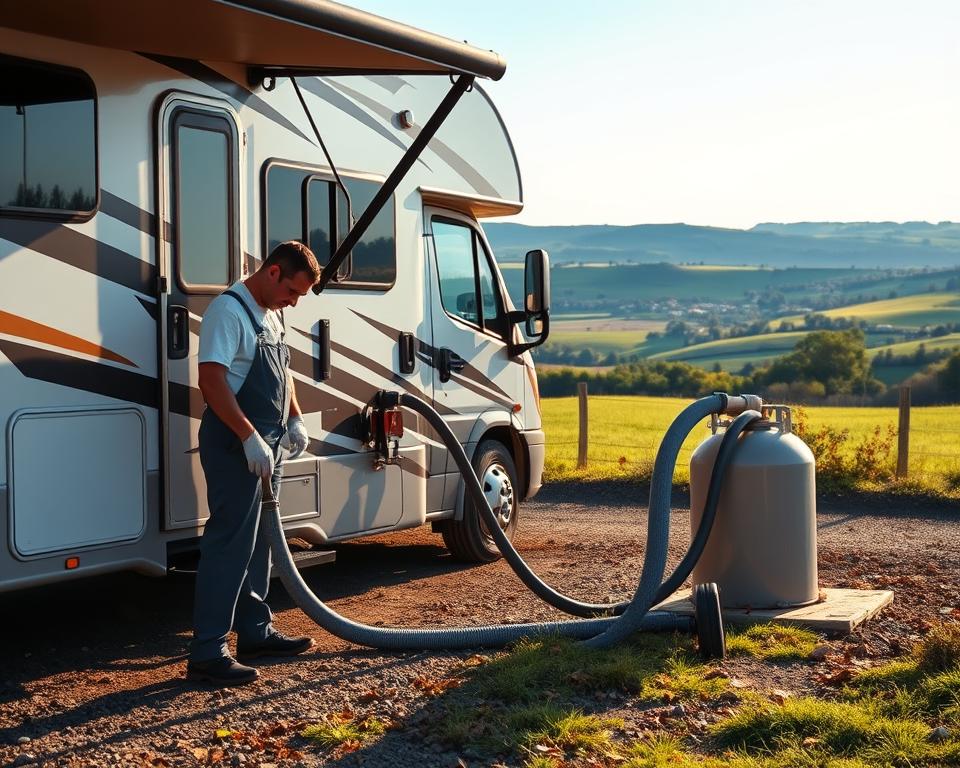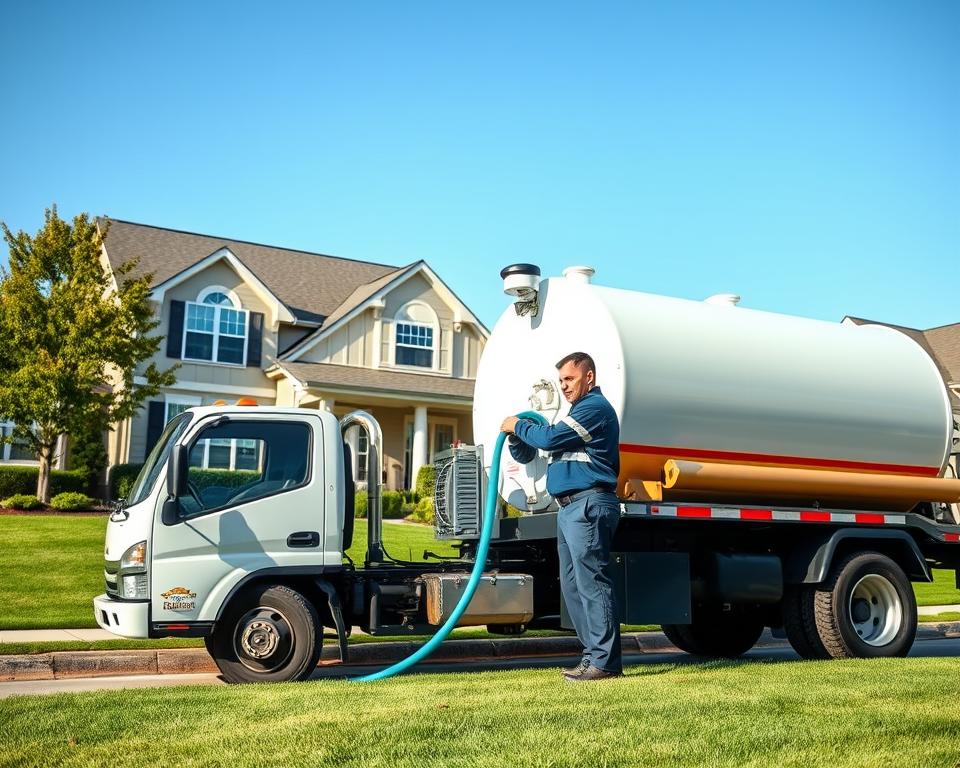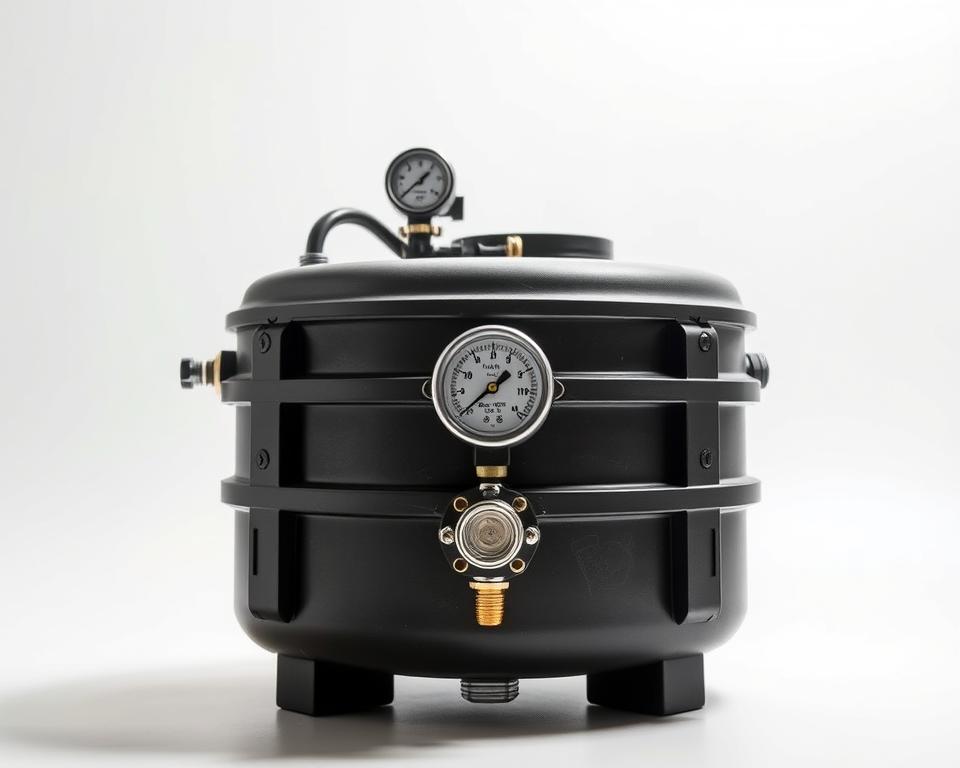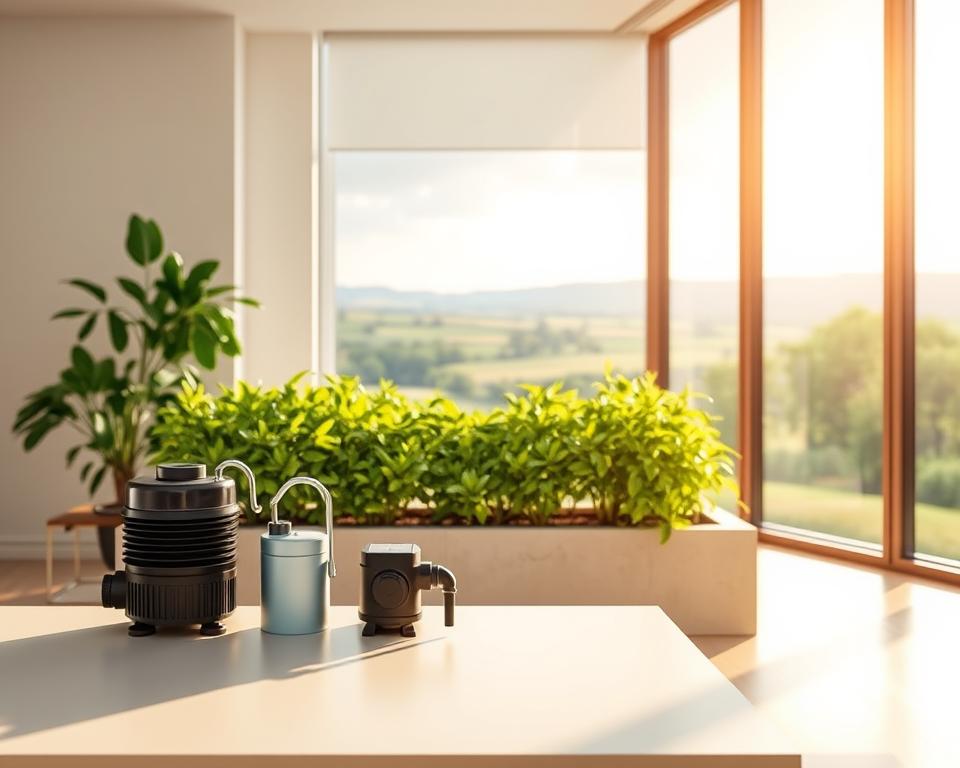Best Pump to Handle RV Waste Holding Tank Solutions
Are you certain your RV’s holding tank pump will process waste management during travel? Picking the perfect RV waste water pump is essential. Many RV owners only understand its significance after encountering issues on the road. Reliable waste handling prevents leaks and clogs at bay and ensures cleanliness, boosting your journeys. The following guide aims to shed light on the important role of pumps in RV waste management, helping smart decisions for your sewage system – camper septic pumping.
Fundamental Learnings
- Recognizing the significance of selecting the best pump for RV holding tanks.
- Effective waste management upgrades hygiene and cleanliness in your RV.
- Well-chosen pumps help prevent leaks and clogs on the road.
- Exploring various kinds of RV pumps for different holding tank needs.
- Making well-informed choices results in a more comfortable RV experience.
Understanding RV Holding Waste Tanks
RV holding tanks are key in managing waste during travel, consisting of two main categories. The gray water tank captures sink and shower runoff, while the black water tank contains toilet waste. Being aware of how these systems interact is vital for effective waste management in RVs.
These reservoirs, commonly manufactured using sturdy plastic or fiberglass, are meant to endure various conditions. Their sizes can range, usually holding 30 to 50 gallons. Understanding tank capacity is critical for trip planning to prevent overflows. Frequent checks and upkeep are necessary to keep these systems running smoothly.
Draining the black water tank can be challenging due to its contents. It needs a specific pump for evacuation, allowing safe and efficient waste removal. Recognizing how these pumps work with the RV holding tanks is vital. It avoids blockages and delivers a hassle-free disposal process.
Why You Need an Reliable Pump for RV Holding Tank
Traveling in an RV brings freedom and the thrill of adventure. However, managing waste is a major task that needs attention. Having an capable pump for your RV’s holding tank ensures smooth waste disposal. It keeps away the issues of bad smells and potential overflows on the road.
Many RV owners don’t always grasp the urgent need for a dependable RV black tank pump. However, a failing pump can flip your camping trip into a disaster fast. By choosing a long-lasting portable RV pump, you maintain your living space stays sanitary—essential for a comfortable and healthy travel experience.
Ignoring waste management in your RV risks not just discomfort but also health dangers. A trustworthy pump ensures a clean environment, crucial for RV lovers. Thus, prioritizing waste management is key to boosting your travel experience.

Types of RV Pumps
For managing waste in an RV, it’s critical to know the types of RV pumps available. There’s a variety to choose from, each with specific features built for different needs. The RV macerator pump is distinctly efficient, shredding solid waste into liquid slurry for easy disposal.
The well-known RV pumps include:
- Portable RV Pumps: Easy-to-carry and easily connected to a sewer drain, ideal for short trips or rapid waste management solutions.
- RV Macerator Pumps: These grind waste into slurry, streamlining the disposal process. Their adaptability makes them excellent for various RV setups.
- Traditional Wastewater Pumps for Campers: Employing simple mechanics, these pumps remove waste but may struggle with solids compared to other types. They’re budget-friendly and straightforward.
To pick the ideal pump, consider your RV’s unique needs and layout. Each pump offers advantages that can improve waste management, improving your camping outings.
Selecting the Optimal Pump for RV Black Water Tank
Opting for the best pump for an RV black water tank demands attention to several aspects. Longevity is key. A strong RV pump survives harsh environments, providing longevity. You’ll want a pump made from materials that resist corrosive waste effectively.
The power of the pump is just as important. It should offer strong suction and discharge to manage waste efficiently. Notably in isolated spots, verify the pump’s power matches your RV’s black water system needs.
Consider ease of use as well. An ideal pump is easy to operate, rendering connections and disconnections a breeze. Features like foot switches or automatic shut-offs bring convenience and streamline operation.
Striking the perfect mix between quality and cost is vital when shopping for a pump. With many options available, gettting a robust RV pump at a fair price is possible. Brands like Camco, Flojet, and Thetford offer dependable pumps suiting various budgets.
Ensuring the pump matches your RV’s specifics is important. Check the pump’s size and waste handling capacity to verify compatibility. The proper pump enhances functionality and boosts the overall RV experience.
Factors to Consider When Selecting a Pump for RV Holding Tank
As you select a pump for your RV holding tank, there are several critical factors to consider. These points will aid in picking a sewage pump that matches your needs properly.
The flow rate is a primary factor. It determines the pump’s efficiency in waste removal, shaping your efficiency on trips. Estimate your needs based on tank size and usage frequency.
Guarantee shows the manufacturer’s product confidence. Select pumps with extended warranties to protect your investment. This offers support for any future complications.
Mounting simplicity is notable. Some pumps provide quick setup, while others need professional help. If you plan a DIY install, choose a pump that’s easy to install based on your skills.
Factor in portability, particularly for frequent travelers. A compact pump boosts convenience. Evaluate the pump’s ease of transport and storage.
Budgeting is important. Pumps range in cost, but quality is paramount. Find a pump that suits your budget by evaluating different brands.
Lastly, customer reviews and brand reputation are impactful. They provide insight into performance and potential issues. Make sure to scan user experiences and recommendations before purchasing.
Recommended Steps for Caring for Your RV Pump
To secure your RV pump works smoothly and lasts longer, it’s vital to maintain it consistently. Steady upkeep can protect you from expensive repairs and urgent issues. Following these best practices is central for top performance.
Start by inspecting your pump monthly. Check for any signs of damage, such as leaks or cracks. Make sure the electrical connections are in good condition and corrosion-free.
Keeping the system clean is critical. Flush the RV black tank with clean water often to wash out leftover waste and stop blockages. Products like Bio-Clean leverage natural enzymes and bacteria to keep your RV’s waste system clean.
How you store your RV and pump is critical. They should be kept in a dry area to avoid damage from the elements. Ahead of storage, check the pump is drained to avoid bacteria growth and freezing.
| Maintenance Task | Frequency | Details |
|---|---|---|
| Inspect Pump and Components | Monthly | Check for leaks, wear, and electrical issues. |
| Flush RV Black Tank | After Each Use | Clear residual waste to prevent clogs. |
| Use Cleaning Products | Monthly | Utilize enzyme-based cleaners to maintain system cleanliness. |
| Drain Before Storage | Seasonally | Prevent freezing and build-up during storage. |
Adhering to these maintenance tips will enhance your RV pump’s performance and longevity. Steady care ensures efficient waste management, producing a better RV experience.
Top-Rated RV Pumps on the Market
RV enthusiasts value reliability in managing waste. The Flojet model impresses due to its reliable performance and simplicity in setup. It’s a high-output pump for RV holding tanks, efficiently clearing waste. This convenience makes disposal into a hassle-free task on your journeys.
Sani-Con by Thetford is another brand to consider. It features a unique macerator to grind waste before pumping, resulting in a smoother transfer process. Users often laud this model for its innovation and dependability. It’s an superb selection for upgrading your RV’s waste system.
Clean Dump is noteworthy for its lightweight design and ease of use. It’s ideal for RV owners who prioritize convenience. With this pump, achieving effective waste management becomes worry-free, improving your travel experience.
| Pump Model | Brand | Features | Price Range |
|---|---|---|---|
| Flojet 18555 | Flojet | Self-priming, durable, easy to install | $120 – $150 |
| Sani-Con 4000 | Thetford | Macerator pump, 3-in-1 function, effortless waste transfer | $300 – $350 |
| Clean Dump Portable | Clean Dump | Compact, lightweight, user-friendly design | $100 – $130 |
How to Install RV Pumps
Installing a sewage pump in an RV is feasible with the right knowledge. It’s essential to respect the manufacturer’s instructions for best performance. Here’s how to install RV pumps effectively:
- Study the Guide: First, reading the installation manual completely. It holds important guidelines specific to your pump model.
- Gather the Tools: Get together all necessary tools, including wrenches, screwdrivers, and sealants. This advance setup ensures the installation smoother.
- Find an Easy-Access Position: Select a spot for easy maintenance access. The pump should be placed for efficient waste drainage and to avoid blockages.
- Confirm Voltage and Amps: Know the power needs and wiring details. Incorrect wiring could cause the pump to fail.
- Tighten Connections: Make sure all connections are leak-proof. Use the proper plumbing tape or sealants for secure fittings.
- Test-Run: Perform a comprehensive test post-installation. This is to check for leaks and ensure the pump’s functionality.
For those new in plumbing, bringing in a professional is sensible to avoid costly errors. Grasping the details of sewage pump installation boosts your RV’s waste system’s reliability. It delivers safe and smooth operation.
Frequent Troubles with RV Holding Tank Pumps
RV owners regularly experience problems with their holding tank pumps, affecting their travel experience. Recognizing and grappling with these issues is critical for proper troubleshooting and maintenance. Clogs from solid waste or debris can significantly hinder a pump’s function. Regular checks are vital to stop such malfunctions.
Motor failures pose a major threat to the functionality of RV holding tanks. Electrical issues or a burnt-out motor may force the pump to cease working. By carrying out routine inspections of the motor and electrical connections, you can avoid extensive repairs.
Leaks in the system are often missed but can lead to significant problems. These leaks might allow waste to escape, creating odors and potential health risks. Prompt identification and repair of leaks are necessary for maintaining system integrity.
| Issue | Symptoms | Recommended Action |
|---|---|---|
| Clogs | Pumping poor or minimal | Inspect hoses and remove obstructions. |
| Motor Failure | Pump not operating | Check electrical connections and replace if necessary. |
| Leaks | Smells and visible liquid | Locate leak source and reseal or replace damaged parts. |
Being aware of these common issues helps RV owners troubleshoot efficiently. Performing proactive maintenance and inspections can substantially minimize RV black tank issues, creating a superior traveling experience for everyone involved.
Green Concerns for RV Waste Management
RV waste management is crucial, centering on how owners get rid of waste responsibly. It’s not just about complying with laws but also guarding ecosystems. Learning the right way to handle black and gray water minimizes environmental harm.
Opting for biodegradable products for tank upkeep supports sustainability. These substances break down naturally, cutting potential pollution during waste treatment. It’s important to avoid flushing items that won’t break down as they cause blockages and additional disposal problems.
The wrong disposal methods can greatly impact wildlife and vegetation. For example, water bodies polluted with RV waste destroy aquatic ecosystems, affecting fish and their habitats. Sustainable practices in RV waste management preserve environmental well-being and support conservation.
Options to Traditional RV Pump Systems
RV owners are increasingly seeking new ways to process waste more eco-consciously. Alternatives beyond the conventional RV pumps have become popular. For instance, the composting toilet slashes the amount of waste. It requires little to no water for operations. This innovative option leverages aerobic bacteria and natural processes to transform waste into compost.
Another route gaining popularity is the gravity-fed system. These systems rely on gravity to transport waste to designated holding areas or directly out. To work effectively, these require a strategic design for efficient waste flow. Given the right setup, they present a dependable solution.
| Alternative | Benefits | Drawbacks |
|---|---|---|
| Composting Toilets | Reduces waste overall, no water needed, environmentally friendly | Needs regular maintenance, higher upfront costs |
| Gravity-Fed Systems | Uncomplicated design, lacks mechanical parts, demands less upkeep | Installation and planning need precision, might not work everywhere |
Learning about these RV waste management solutions enables RV owners to pick wisely for their setups. Considering these alternatives creates better waste handling while considering the environmental footprint.
To Conclude
Choosing the right pump for your RV’s holding tank is critical for managing waste properly. High-quality pumps, combined with ongoing maintenance, deliver efficient system operations. This effectiveness improves the camping experience. Additionally, staying current with advancements in RV wastewater technology can make waste management less taxing and environmentally friendly.
Adopting sustainable practices aids RV travelers protect the environment. It also promotes a sense of responsibility within the RV community. Therefore, choosing the best RV holding tank solutions is paramount to satisfying and carefree journeys. It guarantees both travelers and the environment are well-cared for.
In essence, grasping waste management’s significance is crucial, whether you’re experienced or just starting to RV living. Keep your pump in great condition and get rid of waste thoughtfully. By doing so, you’ll guarantee many guilt-free road trips ahead.


